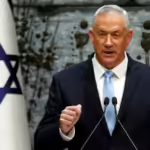The Arab League on Thursday called for a UN peacekeeping force in the Palestinian territories and an international peace conference at a summit dominated by the war between Israel and Hamas.
In a concluding statement following a meeting in Manama, the 22-member grouping called for “international protection and peacekeeping forces of the United Nations in the occupied Palestinian territories” until a two-state solution is implemented.
It also adopted calls by host Bahrain’s King Hamad and Palestinian president Mahmud Abbas to “convene an international conference under the auspices of the United Nations, to resolve the Palestinian issue on the basis of the two-state solution”.
The meeting of Arab heads of state and government convened in Bahrain more than seven months into the conflict in Gaza that has convulsed the wider region.
- ALERT: NIMET predicts flooding in Kano during 2024 rainy season
- Nigerian military declares Nigerien Terrorist, Halilu Buzu, wanted
The Gaza war broke out after Hamas’s attack on southern Israel which resulted in the deaths of more than 1,170 people, mostly civilians, according to an AFP tally of Israeli official figures.
The militants also seized about 250 hostages, 128 of whom Israel estimates remain in Gaza, including 36 the military says are dead.
Israel’s military retaliation has killed at least 35,272 people, mostly civilians, according to the Hamas-run Gaza’s health ministry, and an Israeli siege has brought dire food shortages and the threat of famine.
Ceasefire in Gaza
The league also separately, called for an “immediate” ceasefire in Gaza and an end to forced displacement in the Palestinian territory.
Abbas told the summit his rival Hamas gave Israel “pretexts and justifications” to wage war on Gaza with its October 7 attack.
Hamas voiced its “regret over the remarks” asserting the attack had “placed our Palestinian cause at the forefront of priorities, achieving strategic gains”.
It also welcomed the league’s final statement and urged “brotherly Arab states to take the necessary measures to compel the (Israeli) occupation to stop its aggression”.
Speaking at the summit, UN Secretary-General Antonio Guterres described the Gaza war as “an open wound that threatens to infect the entire region”, calling for “the immediate and unconditional release of all hostages”.
Guterres said, “The only permanent way to end the cycle of violence and instability is through a two-state solution”.
In response to the calls for peacekeepers, a UN spokesman said any creation of a mission would be dependent on “a mandate from the Security Council” and “acceptance by the parties of the UN presence”.
This, the secretary-general’s deputy spokesman said, “is something that would need to be established and those are not things we take for granted”.
The “Manama Declaration” issued by the Arab nations also urged “all Palestinian factions to join under the umbrella of the Palestine Liberation Organization”, which is dominated by Abbas’s ruling Fatah movement.
It added that it considered the PLO “the sole legitimate representative of the Palestinian people”.
Red Sea attacks
It is the first time the bloc has come together since an extraordinary summit in Riyadh, the capital of neighbouring Saudi Arabia, in November that also involved leaders from the 57-member Organisation of Islamic Cooperation, based in the Saudi city of Jeddah.
While in November leaders declined the approval of punitive steps against Israel, Kuwaiti analyst Zafer al-Ajmi told AFP the meeting in Manama differed from recent summits.
Western public opinion has become “more inclined to support the Palestinians and lift the injustice inflicted on them” since Israel’s creation more than 70 years ago, Ajmi said.
Meanwhile, Israel had failed to achieve its war objectives including destroying Hamas and was now mired in fighting, he said.
In a campaign they say is in solidarity with Palestinians amid the Gaza war, Yemen’s Iran-backed Huthis have launched a flurry of attacks on vital shipping lanes in the Red Sea and Gulf of Aden since November.
The summit in Bahrain “strongly condemned the attacks on commercial ships”, saying they “threaten freedom of navigation, international trade, and the interests of countries and peoples of the world”.
The declaration added the Arab nations’ commitment to “ensuring freedom of navigation in the Red Sea” and surrounding areas.
An Arab-Israeli war in 1967 saw Israel seize the Palestinian territories of the West Bank, east Jerusalem and the Gaza Strip.
Israel later annexed east Jerusalem, and successive Israeli governments have encouraged Jewish settlements in the Palestinian territories.
Under international law, the Palestinian territories, including Gaza, remain occupied, and Israeli settlements in east Jerusalem and the West Bank are considered illegal.

 Join Daily Trust WhatsApp Community For Quick Access To News and Happenings Around You.
Join Daily Trust WhatsApp Community For Quick Access To News and Happenings Around You.



